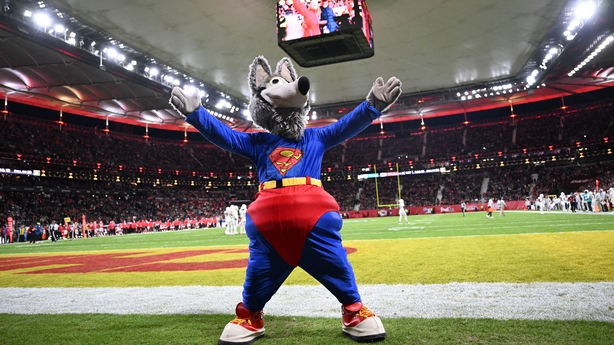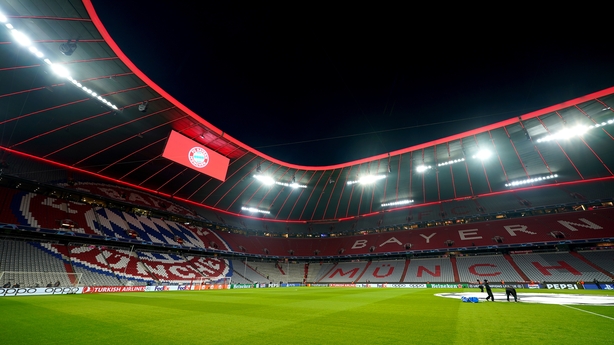Euro 2024 begins next week in Germany when a total of 51 matches (all live on RTÉ) will be hosted in 10 cities over 31 days.
Here, we take at each of the tournament venues.
BERLIN
Stadium name: Olympic Stadium
Capacity: 71,000
The Olympic Stadium in Germany's capital will host the final on 14 July, one of the quarter-finals and three group games. Home to Hertha Berlin, it is the tournament’s biggest venue and staged the 2006 World Cup final and the 2015 Champions League final.
Matches: Group stage, Spain v Croatia (15 June, 6pm), Poland v Austria (21 June, 6pm), Netherlands v Austria (25 June, 6pm), last 16, 2A v 2B (29 June, 6pm), Quarter-final (6 July, 9pm), Final (14 July, 9pm).
COLOGNE
Stadium name: Cologne Stadium
Capacity: 43,000
Both England and Scotland will play one of their group games at the Cologne Stadium, which will also host one of the round-of-16 matches. Previously known as the Mungersdorfer and home to Cologne since 1923, it was redeveloped to host group games at the 2006 World Cup.
Matches: Group stage, Hungary v Switzerland (15 June, 3pm), Scotland v Switzerland (19 June, 9pm), Belgium v Romania (22 June, 9pm), England v Slovenia (25 June, 9pm), last 16, 1B v 3A/D/E/F (30 June, 9pm).
DORTMUND
Stadium name: BVB Stadium Dortmund
Capacity: 62,000
The BVB Stadium Dortmund is Germany’s largest football stadium. It has a capacity of over 81,000, which has been reduced for the Euros due to international regulations. The ground’s famous 'Yellow Wall’, the continent’s biggest all-standing terrace, will be all seating during the tournament.
Matches: Group stage, Italy vs Albania (15 June, 9pm), Turkey v Georgia (18 June, 6pm), Turkey v Portugal (22 June, 6pm), France v Poland (25 June, 6pm), last 16, 1A v 2C (29 June, 9pm), Semi-final (10 July, 9pm).
DUSSELDORF
Stadium name: Dusseldorf Arena
Capacity: 47,000
Home to Fortuna Dusseldorf, the arena has a retractable roof and construction was completed in 2004 when it replaced the Rheinstadion. It was not a chosen venue for the 2006 World Cup, but has since hosted international matches. Three group games, a last-16 tie and a quarter-final will be held there.
Matches: Group stage, Austria v France (17 June, 9pm), Slovakia v Ukraine (21 June, 3pm), Albania v Spain (24 June, 9pm), last 16, 2D v 2E (1 July, 6pm), Quarter-final (6 July, 6pm).
FRANKFURT

Stadium name: Frankfurt Arena
Capacity: 47,000
Built in 1925, the Frankfurt Arena also has a retractable roof following several upgrades. England’s group game against Denmark will be held there, while it hosted matches at Euro 88 and the 2006 World Cup and staged two NFL games last year when Kansas City Chiefs beat Miami Dolphins and Indianapolis Colts defeated New England Patriots.
Matches: Group stage, Belgium v Slovakia (17 June, 6pm), Denmark v England (20 June, 6pm), Switzerland v Germany (23 June, 9pm), Slovakia v Romania (26 June, 6pm), last 16, 1F v 3A/B/C (1 July, 9pm).
GELSENKIRCHEN
Stadium name: Arena AufSchalke
Capacity: 50,000
Another Euro 2024 venue with a retractable roof, Arena AufSchalke also has a slide-out pitch. Constructed in 2004 to replace Schalke’s outdated Parkstadion, it will host England’s opening group game against Serbia. Wayne Rooney was sent off there in England’s quarter-final penalty shoot-out defeat to Portugal at the 2006 World Cup.
Matches: Group stage, Serbia v England (16 June, 9pm), Spain v Italy (20 June, 9pm), Georgia v Portugal (26 June, 9pm), last 16, 1Cv 3D/E/F (30 June, 6pm).
HAMBURG
Stadium name: Volksparkstadion
Capacity: 49,000
Hamburg, Germany’s second largest city, will stage four group games and a quarter-final at Volksparkstadion, which hosted the 2010 Europa League final when Fulham lost 2-1 to Atletico Madrid and a 2006 World Cup quarter-final. It was built in 1953 – Hamburg moved into the stadium in 1963 – and has had several upgrades.
Matches: Group stage, Poland v Netherlands (16 June, 3pm), Croatia v Albania (19 June, 3pm), Georgia v Czech Republic (22 June, 3pm), Czech Republic v Turkey (26 June, 9pm), Quarter-final (5 July, 9pm).
LEIPZIG
Stadium name: Leipzig Stadium
Capacity: 40,000
Leipzig Stadium, the largest football venue in eastern Germany, was rebuilt in 2004 and renovated in 2015. It was a 2006 World Cup venue and has been home to Bundesliga side Leipzig since the 2009-10 season. Three group games, including the Netherlands versus France, and a round-of-16 tie will be staged there.
Matches: Group stage, Portugal v Czech Republic (18 June, 9pm), Netherlands v France (21 June, 9pm), Croatia v Italy (24 June, 9pm), last 16, 1D v 2F (2 July, 9pm).
MUNICH

Stadium name: Munich Football Arena
Capacity: 66,000
Bayern Munich’s home stadium will host one of the semi-finals as well as a last-16 match and four group games, including Scotland’s opener against hosts Germany. Chelsea beat Bayern on penalties to win the 2012 Champions League final at the venue, which also hosted Italy’s 2-1 Euro 2020 quarter-final victory against Belgium.
Matches: Group stage, Germany vs Scotland (14 June, 9pm), Romania v Ukraine (17 June, 3pm), Slovenia v Serbia (20 June, 3pm), Denmark v Serbia (25 June, 9pm), last 16, 1E v 3A/B/C/D (7 July, 6pm), Semi-final (9 July, 9pm).
STUTTGART
Stadium name: Stuttgart Arena
Capacity: 51,000
Stuttgart’s home ground has a long tradition of staging major sporting events, dating back to the 1959 European Cup final. It was a venue for the 1974 and 2006 World Cups and also hosted the 1993 World Athletics Championships before being redeveloped into a football-specific stadium in 2009. Scotland will play their last group game against Hungary at the arena.
Matches: Group stage, Slovenia v Denmark (16 June, 6pm), Germany v Hungary (19 June, 6pm), Scotland v Hungary (23 June, 9pm), Ukraine v Belgium (26 June, 6pm), Quarter-final (5 July, 6pm).
Watch every game from Euro 2024 on RTÉ2 and RTÉ Player as well as highlights and goals as they happen on RTÉ Sport digital platforms
Listen to the RTÉ Soccer podcast on Apple Podcasts, Spotify or wherever you get your podcasts.

